Is it safe? What are the effects on the baby? Dr. Elmer Huerta analyzes a study that indicates that it could be safe for this sector of the population.
Hello i’m doctor elmer Huerta And this is your daily dose of information about the new coronavirus, information that we hope will be useful to take care of your health and that of your family.
Today we will describe a recent study that shows that vaccinating a pregnant woman could be safe for her and boost the baby’s immunity.
Covid-19 vaccines and pregnant women
One of the points that still cause many questions in vaccination programs is to apply them to pregnant or lactating women, groups of women who –because they were excluded from the phase 3 vaccines trials– could not be studied.
Opinions are divided. While some countries like the United States and Israel recommend that pregnant women get vaccinated, others, such as the United Kingdom and Germany, still do not recommend it, and – adding to the uncertainty – the World Health Organization does not either.
In the United States, the American College of Obstetrics and Gynecology, the Society for Maternal Fetal Medicine and the Academy of Breastfeeding recall that COVID-19 is a disease that places pregnant women in a position of high risk of complications, according to with the Centers for Disease Control and Prevention (CDC). And they recommend the vaccine because it is capable of reducing that risk.
They also say that, since there is already a history of excellent tolerance of multiple vaccines during pregnancy, the new ones do not have to be the exception.
What does the Harvard study say?
A recent study, published by Harvard University researchers in the March 25 American Journal of Obstetrics and Gynecology, sheds some light on the controversy.
The main objective of the study was to evaluate the ability of the Pfizer / BioNTech and Moderna messenger RNA vaccines to arouse immunity in a group of pregnant women and their babies, comparing it with the immunity of women who suffered natural covid-19 during pregnancy. , and having as a control group a group of non-pregnant women.
In total, 131 women were vaccinated, of whom 84 were pregnant, 31 were lactating and 16 were not pregnant. In 131 infants, antibodies to SARS-CoV-2 were measured in the blood, and in all 31 infants, antibodies in breast milk were measured.
To measure the antibodies in the baby’s blood, the amount of antibodies in the umbilical cord blood of 10 pregnant women who were vaccinated was compared with that of 37 women who became ill with natural covid-19.
The results indicated that the three groups of vaccinated women – pregnant, lactating and non-pregnant – produced equivalent amounts of neutralizing antibodies against the new coronavirus.
The covid-19 vaccine would be safe in pregnant women, according to study
What is interesting is that the amount of neutralizing antibodies produced in response to the vaccine in pregnant women was significantly greater than the amount of antibodies produced in response to the natural disease produced during pregnancy. In other words, the vaccine causes the woman to produce more antibodies than the natural disease.
The neutralizing antibodies generated by the vaccine were also found to be present in all samples of umbilical cord blood and breast milk, indicating that the baby could benefit from the mother’s vaccination.
The authors conclude that the Pfizer / BioNTech and Moderna vaccines generated robust antibody production in pregnant and lactating women, similar to that seen in non-pregnant women.
They also conclude that the immune response induced by the vaccine was significantly more intense than that obtained by the response to natural infection, and that the babies received antibodies through the placenta and breast milk.
The CDC Guide for Pregnant Women
On the other hand, and as to help pregnant women make a better decision about whether or not to get vaccinated, the CDC has released a surveillance report that is made through an application on the cell phone called v-safe , and that it is offered to all people who get vaccinated in the United States.
The analysis indicates that more than 30,000 women voluntarily reported being pregnant to v-safe, and that the immune response profile and adverse events observed in the pregnant women registered in the application did not show any safety problems.
Analysis of data from 1,815 pregnant women who received the Pfizer / BioNTech and Moderna vaccines found that 73% of side effects included non-pregnancy-specific adverse events, for example, local and systemic reactions.
And, even though miscarriage was the most frequently reported pregnancy-specific adverse event, the numbers are well within the miscarriage rates that typically occur in the community.
In summary, scientific evidence indicates that vaccinating pregnant women is safe for her and may give indirect benefits to the baby.
Our advice is that if you are pregnant, talk to your obstetrician to balance the risks and benefits of vaccination and make an informed decision.
Do you have questions about the coronavirus?
Send me your questions on Twitter, we will try to answer them in our next episodes. You can find me at @Drhuerta.
If you think this podcast is useful, help others find it by rating and reviewing it on your favorite podcast app. We’ll be back tomorrow so be sure to subscribe to get the latest episode on your account.
And for the most up-to-date information, you can always head to CNNEspanol.com. Thanks for your attention.

